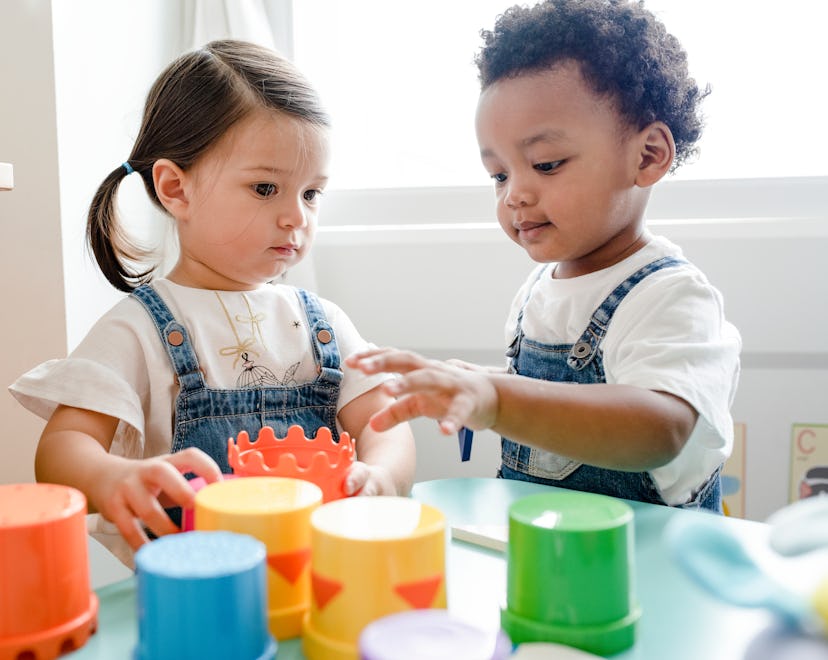Toddlers

Here’s Why Your Toddler Needs Their Own Little Buddies
Experts say you shouldn’t panic about your toddler’s socialization, but it is pretty important.
When we went into lockdown in March 2020, we had no idea that the last time we picked up our son from his parents’ morning out program at his Montessori school would truly be the last time he’d see his classmates, guides, and the outside of his home for almost an entire year. He was only 21 months old, but I of course began to worry about how his socialization would be impacted — especially as an only child. He truly became a different kid in the best ways once he began interacting with kids his own age. He came out of his shell, he seemed more engaged in activities, and he just seemed more well-rounded — if that’s possible for a 21-month-old.
I remember my husband and I worriedly discussing if toddlers needed friends because after a few months of lockdown, it became apparent this was going to be our new normal for longer than we thought. We worried how it would affect our son, and if he’d be socially and emotionally stunted somehow.
When Do Children Begin Forming Relationships?
Carla Manly, clinical psychologist, tells Romper that kids are capable of forming relationships with other children very early in life. “For example, a 1-year-old child can surely ‘play’ with a sibling or similar-aged child. When children begin to play with others in monitored, age-appropriate ways, their social skills naturally develop and improve over time,” she ays.
“Children often begin to engage in more interactive play around the age of 3, although the range of age 2 to 4 is normal. As with other developmental changes, the transition from parallel play to associative play is fluid and depends on a variety of factors, including personality and social exposure.” So while it may look different the older they get, children can forge “friendships” or relationships very early on.
Do Toddlers Need Friends?
The short answer is yes, as friendships help children learn critical social and emotional skills. And once they’re toddlers, they actually begin to consider certain peers “friends” and begin practicing and learning these skills.
Children begin to understand what a “friend” is around the age of 3, says Dr. Lauren Starnes, vice president, early childhood education research and development for Primrose Schools. “Around this age, friendships are usually reciprocal and deliberate as children become more skilled in social interactions and look for peers with shared interests. Learning how to develop friendships is a lifelong process, but these formative early childhood years establish the foundation for forming and maintaining friendships, a critical social development skill.”
Starnes says being around their peers and forming relationships with them helps toddlers learn how to manage emotions, navigate conflict, and think ahead. “Furthermore, children learn from one another, and this interaction helps young children shape their self-identity, learn how to appreciate similarities and differences in others, and builds communication skills,” she says.
“It is essential that children have ample time and space to play freely with their peers, which helps shape their social skills and form friendships,” says Starnes. “Nurturing traits like empathy and kindness helps children develop the social skills necessary to get along with others, which is core to their healthy development.”
Worried About Your Toddler’s Social Skills & Friendships Because Of The Pandemic?
Linda Nelson, program developer from KinderCare Learning Centers tells Romper that, according to KinderCare’s Parent Confidence Report on pandemic parenting, 61% of parents feel that they are constantly battling between protecting their child's health and the desire to socialize their child. Data from Mintel reinforces this finding, showing that soft skills are top learning priorities for parents of toddlers and preschoolers coming out of the pandemic, with the two biggest concerns being how to play well with others and good manners.
“With that said, it is important to remember that children of all ages have an incredible capacity for resiliency,” Nelson says. “Just knowing they have a steady base to return to, a safe place where they’re loved and appreciated for who they are, can give children the courage they need to face the challenge of a new or uncertain social situation with self-confidence and courage.”
Echoing Nelson, Manly says, “It’s important for parents not to worry about any lapses in friendship opportunities during the pandemic. A child who has loving parents will thrive even when something as major as a pandemic interrupts the child’s socialization. In truth, a toddler’s most significant need is to have parents who are loving, stable, and attuned to their needs.”
She says when a child has love and TLC as a strong foundation, any small deficits in the friendship realm will be made up quickly when it’s safe for the child to begin interacting with peers again.
“The biggest fix is this: as parents feel it’s appropriate, slowly engage with other children. Rather than focusing on ‘making up for lost time,’ place an emphasis on having quality, anxiety-free time with peers in small, healthy doses,” Manly says.
Experts:
Carla Manly, a clinical psychologist, author, advocate, and fear specialist
Dr. Lauren Starnes, vice president, early childhood education research and development for Primrose Schools
Linda Nelson, program developer from KinderCare Learning Centers
This article was originally published on